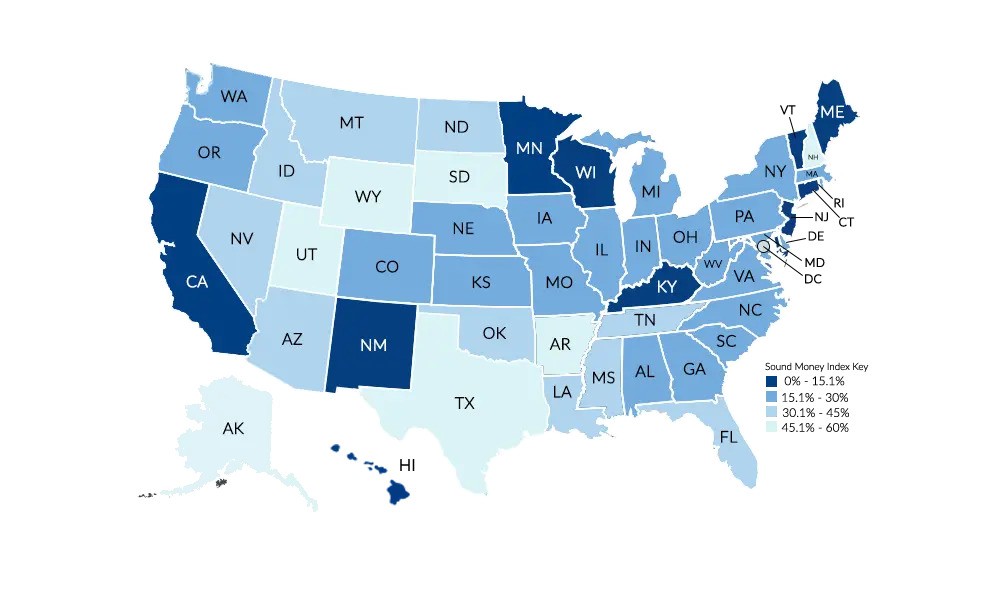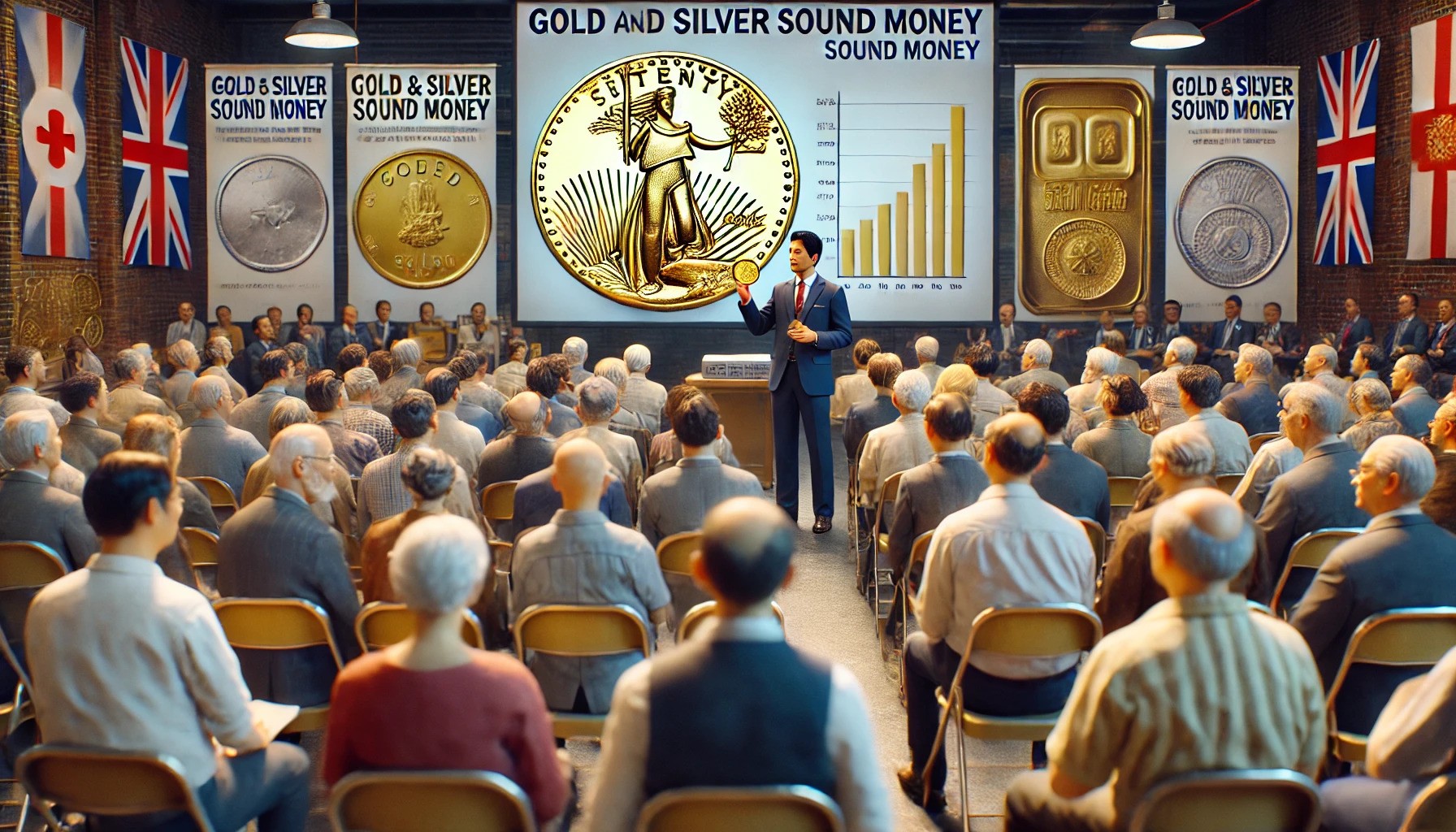(Money Metals News Service) In a recent episode of The Morgan Report, host David Morgan interviewed Stefan Gleason, Chairman of the Sound Money Defense League and President and CEO of Money Metals Exchange.
The conversation explored the principles of sound money, the significance of precious metals in the financial system, and the ongoing legislative efforts to promote these ideals at both the state and federal levels.
Restoring Constitutional Money

David Morgan introduced the Sound Money Defense League’s mission, emphasizing its focus on restoring gold and silver as America’s constitutional money.
Stefan Gleason elaborated on the League’s efforts to counteract the federal government’s and central banks’ policies that debase the currency. He highlighted the League’s work in rallying concerned Americans, collaborating with allies in elective office, and pushing for sound money legislation.
The U.S. Constitution addresses the use of gold and silver as money in Article I, Section 10. The relevant clause states:
Article I, Section 10, Clause 1:
“No State shall… make any Thing but gold and silver Coin a Tender in Payment of Debts…”
This clause restricts the states from making anything other than gold and silver coins a tender in payment of debts, essentially mandating that gold and silver be used as money for settling debts. This provision reflects the framers’ intent to ensure a stable and uniform currency system based on precious metals, which were widely recognized as having historical value.
The State of Sound Money Legislation
Gleason discussed the progress made in states like Utah, where legislation allows for gold and silver to be used in transactions if both parties agree. While acknowledging that the U.S. Constitution already permits states to coin money, he pointed out the practical challenges and the federal government’s role in moving away from the gold standard. Gleason stressed the importance of states like Utah, which have taken steps to encourage the use of gold and silver as money.
Gresham’s Law and Practical Barriers
One major obstacle to the widespread use of gold and silver as currency, according to Gleason, is Gresham’s Law, which states that bad money drives good money out of circulation. People are more inclined to hoard gold and silver as savings rather than spend them, particularly given the convenience of using Federal Reserve Notes and the tax implications of selling precious metals.
Tax Barriers to Gold and Silver

Gleason highlighted the Sound Money Defense League’s primary focus: removing tax barriers. He noted significant progress in eliminating sales taxes on gold and silver purchases in many states. Only five states still impose full sales tax on these transactions. Additionally, efforts are underway to remove state-level income taxes on gold and silver sales, with some successes already achieved.
What is the Sound Money Index?

The Sound Money Index, developed by the Sound Money Defense League and Money Metals Exchange with Stefan Gleason and Jp Cortez, is a comprehensive assessment tool that ranks all 50 U.S. states based on their policies and practices related to sound money, particularly the use of gold and silver as legal tender and the elimination of taxes on precious metals.
The 2024 Sound Money Index, the first of its kind, uses fourteen different indicators to determine which states offer the most pro-sound money environment in the country. Key features include evaluating states’ tax policies, such as whether they impose sales taxes on the purchase of gold, silver, platinum, and palladium coins and bullion, and whether they tax capital gains on the sale of precious metals.
The Index also examines legislative efforts, analyzing if states have passed laws recognizing gold and silver as legal tender and considering other sound money policies like holding state reserves or pension funds in gold bullion, enforcing gold clause contracts, reaffirming gold as money, and limiting regulations on precious metals dealers and investors.
States are awarded points for each pro-sound money policy they enact, with forty percent of the possible points connected to sales and income taxes on monetary metals. The remaining points are awarded for other sound money policies.
The purpose of the Sound Money Index is to promote awareness of the importance of sound money and the role of precious metals in maintaining a stable economic system. By ranking states, the Index encourages policymakers to adopt and improve laws that support sound money principles, thereby reducing barriers to using gold and silver as currency. It also provides a framework for advocacy groups to push for legislative changes that enhance the use and acceptance of precious metals as money.
The Index highlights the significance of gold and silver as money, a principle embraced by the Framers of the Constitution who experienced the drawbacks of fiat paper money. Despite federal policies that have moved away from sound money principles, state-level actions can still promote the use of gold and silver, providing a hedge against inflation and the devaluation of currency.
In collaboration with Money Metals Exchange, the Sound Money Defense League presents the Sound Money Index as an authoritative ranking of all 50 U.S. states’ monetary policies, promoting the adoption of sound money principles through public awareness and legislative advocacy.
State-Level Gold Reserves
Another promising development is the move by some states to hold gold and silver as reserve assets. Gleason cited Utah’s recent legislation allowing the state treasury to hold precious metals, a move that could serve as a model for other states. This trend reflects a growing awareness of the need to hedge against the vulnerabilities of fiat currency and debt-based assets.
Challenges in Remonetizing Gold and Silver

Morgan and Gleason discussed the practical challenges of using gold and silver in everyday transactions. Gleason acknowledged that while technology, such as blockchain and debit cards backed by precious metals, can facilitate this process, the demand for such solutions is currently limited. He expressed skepticism about the viability of private platforms promoting gold and silver transactions, emphasizing the need for long-term investment and state involvement.
Federal Efforts and Congressman Alex Mooney
Gleason praised Congressman Alex Mooney’s efforts to promote sound money at the federal level. Mooney has introduced bills to remove federal income taxes on gold and silver and to audit the U.S. gold reserves. Despite these efforts, Gleason noted that progress at the federal level remains slow, and state-level initiatives have been more successful.
Educating the Public and Financial Professionals

The interview concluded with a discussion on how to better educate the public and financial professionals about the importance of diversifying with precious metals. Gleason emphasized the need for individuals to take control of their own financial decisions, highlighting the role of public policy in raising awareness and removing barriers to gold and silver ownership.
Key Questions and Answers:

Why do we need legislation to use gold and silver as money if the U.S. Constitution already permits it?
While private parties don’t need legislation to transact in gold and silver, the primary issue is the federal level, including the Federal Reserve System and the US Treasury’s de-linking of gold from the Federal Reserve Note. The Constitution encourages states to use gold and silver, but many states have moved away from this practice. Legislation in states like Utah aims to encourage the use of gold and silver once again.
What are the main challenges to using gold and silver as money in commerce?
The primary challenge is Gresham’s Law, which states that bad money (Federal Reserve Notes) pushes good money (gold and silver) out of circulation. People prefer to hoard gold and silver rather than spend it. Additionally, practical barriers include taxes on precious metals, which the Sound Money Defense League aims to remove.
What progress has been made in removing taxes on gold and silver?

Significant progress has been made in removing sales taxes on gold and silver purchases. Currently, only five states fully tax these transactions, down from 32 states in 2014. Efforts are also underway to remove state-level income taxes on gold and silver sales, with some states already achieving this.
How are states incorporating gold and silver into their reserve assets?
Some states, like Utah and Tennessee, are considering or have passed legislation to hold gold and silver as reserve assets. Utah recently passed a bill to invest $150 million in gold and silver for state reserves. This reflects a growing awareness of the need to hedge against fiat currency and debt-based assets.
What is the role of technology in facilitating gold and silver transactions?

While technology like blockchain and debit cards can facilitate gold and silver transactions, the demand for these solutions is currently limited due to Gresham’s Law. Private platforms may struggle to finance themselves until there is a stronger business case for widespread use.
What efforts are being made at the federal level to promote sound money?
Congressman Alex Mooney has introduced several bills, including the Monetary Metals Tax Neutrality Act to remove federal income taxes on gold and silver and the Gold Reserves Transparency Act to audit the U.S. gold reserves. However, progress at the federal level remains slow.
How can the public be better educated about the importance of precious metals?

Public policy efforts and legislative successes at the state level can raise awareness. It’s essential for individuals to educate themselves and take control of their financial decisions. The crises in the financial system often act as wake-up calls for people to consider gold and silver as a hedge.
What is the impact of unscrupulous dealers on the precious metals industry?
Some dealers harm investors by selling overpriced or low-value coins and other products. It is crucial for buyers to focus on the melt value of their purchases and avoid high-premium items. This ensures they get fair value and can easily resell their investments.
How can investment professionals better understand the role of precious metals in a diversified portfolio?
Investment professionals often overlook precious metals due to systemic biases and conflicts of interest. Greater awareness and education about the benefits of holding a percentage of assets in gold and silver are necessary. Financial crises and losses may eventually push more professionals to recommend precious metals as part of a balanced portfolio.
These questions and answers highlight the significant topics covered in the interview, focusing on the legislative, practical, and educational aspects of promoting sound money principles and the role of precious metals in the financial system.
Conclusion

Stefan Gleason’s insights on David Morgan’s The Morgan Report underscored the vital role of sound money principles and the ongoing efforts to promote the use of gold and silver as constitutional money. While challenges remain, particularly at the federal level, the progress made in various states offers hope for the future. The conversation highlighted the importance of continued advocacy, education, and legislative action to ensure a stable and resilient financial system. Start investing in gold and silver today.
